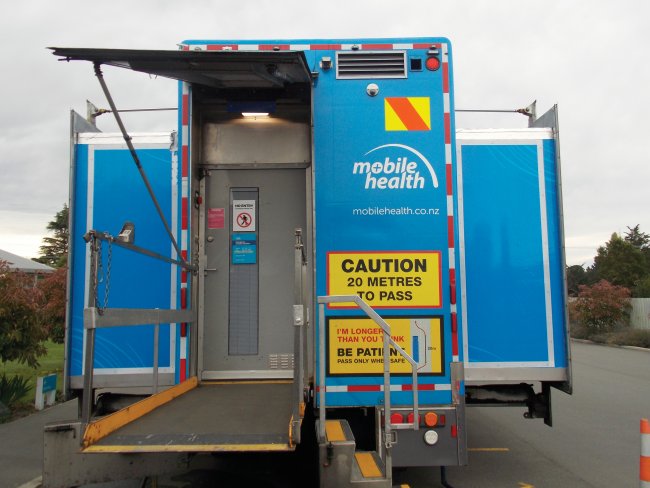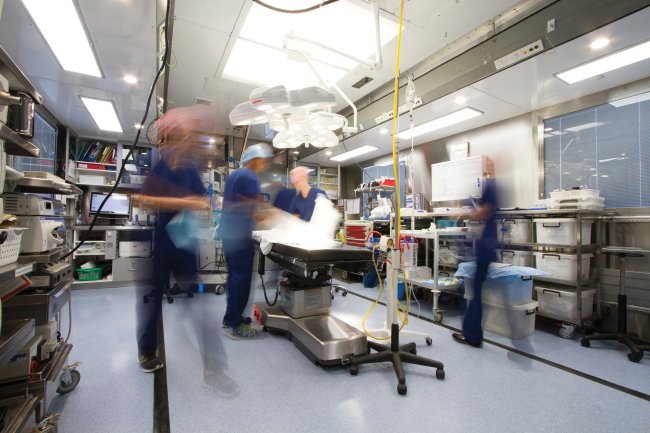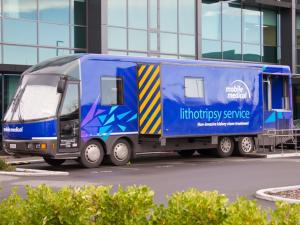Respiratory physician Lutz Beckert considers chronic obstructive pulmonary disease management, including the prevention of COPD, the importance of smoking cessation and pulmonary rehabilitation, and the lifesaving potential of addressing treatable traits. He also discusses the logic of inhaler therapy, moving from single therapy to dual and triple therapy when indicated, as well as other aspects of management
Forty-two tonnes of people power: A change of scene, a new set of skills for practice nurses
Forty-two tonnes of people power: A change of scene, a new set of skills for practice nurses

Fiona Cassie meets rural practice nurses taking time out to don theatre scrubs to work with the country’s mobile surgical unit
They already know the staff and it’s in their backyard, really. And you can ease their anxiety
A walkie-talkie crackles into life and a voice calls for the next patient to be escorted to the big blue truck with swollen, extended sides parked outside the Rangiora Health Hub.
Practice nurse Becky Anderson jumps up to greet the patient and take them the short walk from the hub and up the ramp into Mobile Health’s 42-tonne surgical unit on wheels.
Ms Anderson is one of a trio of North Canterbury practice nurses who had an early start from their rural homes heading south to spend a day in theatre scrubs working for the Mobile Health unit “bus”.
Briefing began at 7am to get through a “huge list” of 15 endoscopies set down for the one-day visit from the big blue vehicle.
The first patient arrives at 7.30am at Te Whatu Ora’s Rangiora hub, 30 minutes north of Christchurch. The practice nurses, who support the bus’ permanent nurse and anaesthetic technician team, are coordinated by Waikari Health Centre, 50km further north again from Rangiora, which manages the Mobile Health contract for North Canterbury.
Leaving their practice for a day “on the bus” every five weeks or so as an operating theatre circulating nurse or in pre or post-operative care is all part and parcel of being a flexible rural nurse for these three. They grab the chance to brush up and build skills, while helping ensure rural patients have access to a low-key, local option for low-risk elective day surgery
Many patients, says Waikari practice nurse Sue Smith, are put off surgery by the need to travel to Christchurch Hospital. “They say ‘I struggle with traffic lights and the parking is horrendous’ and you can say to them well, let’s check whether you are eligible for the bus.”
Ms Smith is the bus veteran of the group: she assisted with a mobile hernia repair operation on the unit’s first visit to Waikari in 2008.
That was the year that local practices succeeded in working with the local DHB and PHO to bring the unit to North Canterbury, initially Waikari and more recently Rangiora.
At the time, Ms Smith was a district nurse at Amuri Community Health Centre. Now, she can look back on about a decade as a practice nurse at Waikari Health Centre.
It’s Ms Anderson’s fourth year on the bus. She is based at the Amuri centre, where she has been a district nurse for many years and more recently added practice nursing as well.
Robyn Frost’s time on the bus began five years ago when she became a practice nurse at Waikari. She is also a school nurse one day a week at nearby Hurunui College.
The nurses say working in their communities, they often see patients whose symptoms and circumstances make them candidates for possible referral to the bus, so the nurses raise this with the patient’s GP or nurse practitioner.
How long it takes to get onto the bus can vary widely, with one patient that day waiting for 18 months; others are seen within weeks.
- Mobile Health’s first surgical ‘bus’ hit the road in 2002 and has since delivered low-risk elective day surgery to more than 30,500 mostly rural patients from Kaikohe to Gore.
- A private company, Mobile Health has a contract to work with Te Whatu Ora districts to determine the surgical specialties that are delivered to patients in each of the 25 rural communities it serves.
- Increasingly, the bus works in south Auckland to help reduce the district’s paediatric dental waiting list.
- In 2021/22, paediatric dental surgery made up 58 per cent of its annual patient load, followed by endoscopy (30 per cent), orthopaedics (4 per cent), general surgery (4 per cent) and gynaecology (2 per cent).
Surgical bus nursing is just another skill to add to the “jill of all trades” role that is rural practice nursing for Waikari Health Centre nurse Sue Smith.
Ms Smith is as comfortable driving a combine harvester on the family sheep, beef and cropping farm as she is responding to a car accident as a nurse trained for the Primary Response in Medical Emergencies (PRIME) service.
Rural to the core having grown up in an isolated farming community in the Canterbury high country, she says there were big snows in winter. “And when neighbours were pregnant [and needed evacuating], you’d have to go and put a big red cochineal cross on the snow outside so the helicopter knew were to land.”
As a practice nurse, Ms Smith specialises in respiratory conditions and her nursing tool kit includes offering spirometry services so patients don’t have to drive an hour to Christchurch.
Fellow Waikari practice, PRIME and surgical bus nurse Robyn Frost says the scope of rural nursing is as big as you want it to be. Her skills include school nursing to rural teenagers. Both she and Ms Smith are signed up to do the community nurse prescribing course. Ms Frost is also taking on the B4 School Check role.
The two nurses are part of the Waikari PRIME team that provides rapid response services to car accidents or suspected heart attacks during office hours (with St John covering out-of-hours emergencies).
Sometimes, says Ms Smith, farm accident victims turn up bloody at the clinic door as they don’t want to bother their St John or fire brigade volunteer neighbours by calling 111.
Ms Smith and Ms Frost are also part of Waikari’s four-nurse team rostered on to support local patients after hours with nonemergency health concerns.
Rural practice nursing is a big role with ongoing professional development commitments, but it doesn’t come with hospital pay rates, they say.
“At a reunion at the weekend, one of the farmers asked me how much I was earning and he said ‘I’m paying my shed hands as much as you guys’,” says Ms Smith.
While she hopes to see pay parity, it’s her community spirit and love of working with rural people that keeps her nursing.
“I feel it’s all just part of what you do rurally to help each other.”
What is clear to the trio is that the patients love it when they get their day on the bus. Patients who know them from their local practice particularly enjoy finding a familiar face on arrival.
“Some of them say it’s the most relaxing procedure they’ve had because they already know the staff and it’s in their backyard, really,” says Ms Smith. “And you can ease their anxiety.”
Ms Frost says working in a bigger clinical team than in their normal day jobs is also an attraction of the bus role.
On the general surgery days as a circulating nurse, she gets taught to scrub, set up a trolley and support the surgeon – “all stuff that I would never have been exposed to” as a practice nurse.
Because they do the job only once every five or so weeks, it can be “nerve-wracking”, however, Ms Frost says the permanent nursing staff and visiting surgeon are supportive, “and it’s just nice doing something different”.
During the early days of the pandemic in 2020 the bus team and local rural nurses helped Canterbury reduce its elective waiting list as the country emerged from its first level 4 lockdown into level 3 restrictions.
“They had a heap of us all camped up in a motel in Rangiora for five days and we did a real bit of ccatch-up,” recalls Ms Anderson.
We're publishing this article as a FREE READ so it is FREE to read and EASY to share more widely. Please support us and our journalism – subscribe here
One of the benefits of subscribing is you will also be able to share your thoughts about what you read with other in our Comment Stream. You can also take notes on what you read with Capture










![Barbara Fountain, editor of New Zealand Doctor Rata Aotearoa, and Paul Hutchison, GP and senior medical clinician at Tāmaki Health [Image: Simon Maude]](/sites/default/files/styles/thumbnail_cropped_100/public/2025-03/Barbara%20Fountain%2C%20editor%20of%20New%20Zealand%20Doctor%20Rata%20Aotearoa%2C%20and%20Paul%20Hutchison%2C%20GP%20and%20senior%20medical%20clinician%20at%20T%C4%81maki%20Health%20CR%20Simon%20Maude.jpg?itok=-HbQ1EYA)
![Lori Peters, NP and advanced health improvement practitioner at Mahitahi Hauora, and Jasper Nacilla, NP at The Terrace Medical Centre in Wellington [Image: Simon Maude]](/sites/default/files/styles/thumbnail_cropped_100/public/2025-03/2.%20Lori%20Peters%2C%20NP%20and%20advanced%20HIP%20at%20Mahitahi%20Hauora%2C%20and%20Jasper%20Nacilla%2C%20NP%20at%20The%20Terrace%20Medical%20Centre%20in%20Wellington%20CR%20Simon%20Maude.jpg?itok=sUfbsSF1)
![Ministry of Social Development health and disability coordinator Liz Williams, regional health advisors Mary Mojel and Larah Takarangi, and health and disability coordinators Rebecca Staunton and Myint Than Htut [Image: Simon Maude]](/sites/default/files/styles/thumbnail_cropped_100/public/2025-03/3.%20Ministry%20of%20Social%20Development%27s%20Liz%20Williams%2C%20Mary%20Mojel%2C%20Larah%20Takarangi%2C%20Rebecca%20Staunton%20and%20Myint%20Than%20Htut%20CR%20Simon%20Maude.jpg?itok=9ceOujzC)
![Locum GP Helen Fisher, with Te Kuiti Medical Centre NP Bridget Woodney [Image: Simon Maude]](/sites/default/files/styles/thumbnail_cropped_100/public/2025-03/4.%20Locum%20GP%20Helen%20Fisher%2C%20with%20Te%20Kuiti%20Medical%20Centre%20NP%20Bridget%20Woodney%20CR%20Simon%20Maude.jpg?itok=TJeODetm)
![Ruby Faulkner, GPEP2, with David Small, GPEP3 from The Doctors Greenmeadows in Napier [Image: Simon Maude]](/sites/default/files/styles/thumbnail_cropped_100/public/2025-03/5.%20Ruby%20Faulkner%2C%20GPEP2%2C%20with%20David%20Small%2C%20GPEP3%20from%20The%20Doctors%20Greenmeadows%20in%20Napier%20CR%20Simon%20Maude.jpg?itok=B0u4wsIs)
![Rochelle Langton and Libby Thomas, marketing advisors at the Medical Protection Society [Image: Simon Maude]](/sites/default/files/styles/thumbnail_cropped_100/public/2025-03/6.%20Rochelle%20Langton%20and%20Libby%20Thomas%2C%20marketing%20advisors%20at%20the%20Medical%20Protection%20Society%20CR%20Simon%20Maude.jpg?itok=r52_Cf74)
![Specialist GP Lucy Gibberd, medical advisor at MPS, and Zara Bolam, urgent-care specialist at The Nest Health Centre in Inglewood [Image: Simon Maude]](/sites/default/files/styles/thumbnail_cropped_100/public/2025-03/7.%20Specialist%20GP%20Lucy%20Gibberd%2C%20medical%20advisor%20at%20MPS%2C%20and%20Zara%20Bolam%2C%20urgent-care%20specialist%20at%20The%20Nest%20Health%20Centre%20in%20Inglewood%20CR%20Simon%20Maude.jpg?itok=z8eVoBU3)
![Olivia Blackmore and Trudee Sharp, NPs at Gore Health Centre, and Gaylene Hastie, NP at Queenstown Medical Centre [Image: Simon Maude]](/sites/default/files/styles/thumbnail_cropped_100/public/2025-03/8.%20Olivia%20Blackmore%20and%20Trudee%20Sharp%2C%20NPs%20at%20Gore%20Health%20Centre%2C%20and%20Gaylene%20Hastie%2C%20NP%20at%20Queenstown%20Medical%20Centre%20CR%20Simon%20Maude.jpg?itok=Z6u9d0XH)
![Mary Toloa, specialist GP at Porirua and Union Community Health Service in Wellington, Mara Coler, clinical pharmacist at Tū Ora Compass Health, and Bhavna Mistry, specialist GP at Porirua and Union Community Health Service [Image: Simon Maude]](/sites/default/files/styles/thumbnail_cropped_100/public/2025-03/9.%20Mary%20Toloa%2C%20Porirua%20and%20Union%20Community%20Health%20Service%20in%20Wellington%2C%20Mara%20Coler%2C%20T%C5%AB%20Ora%20Compass%20Health%2C%20and%20Bhavna%20Mistry%2C%20PUCHS%20CR%20Simon%20Maude.jpg?itok=kpChr0cc)